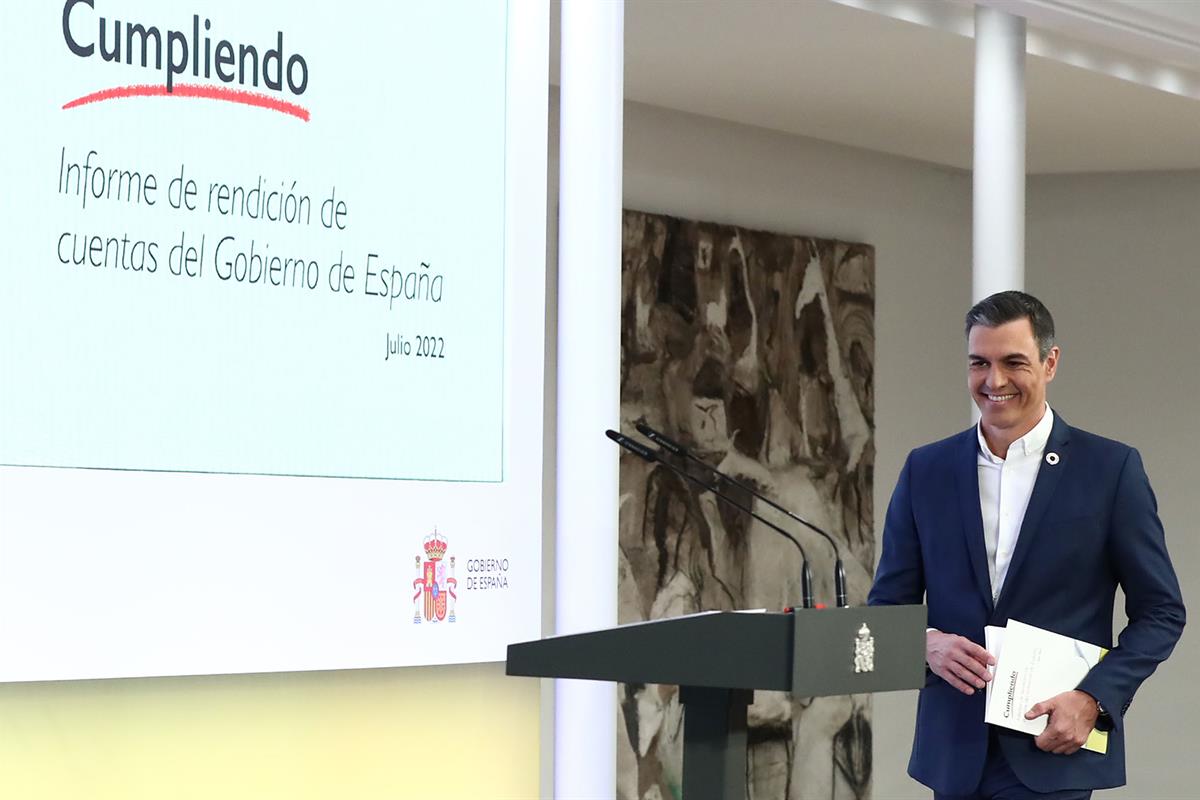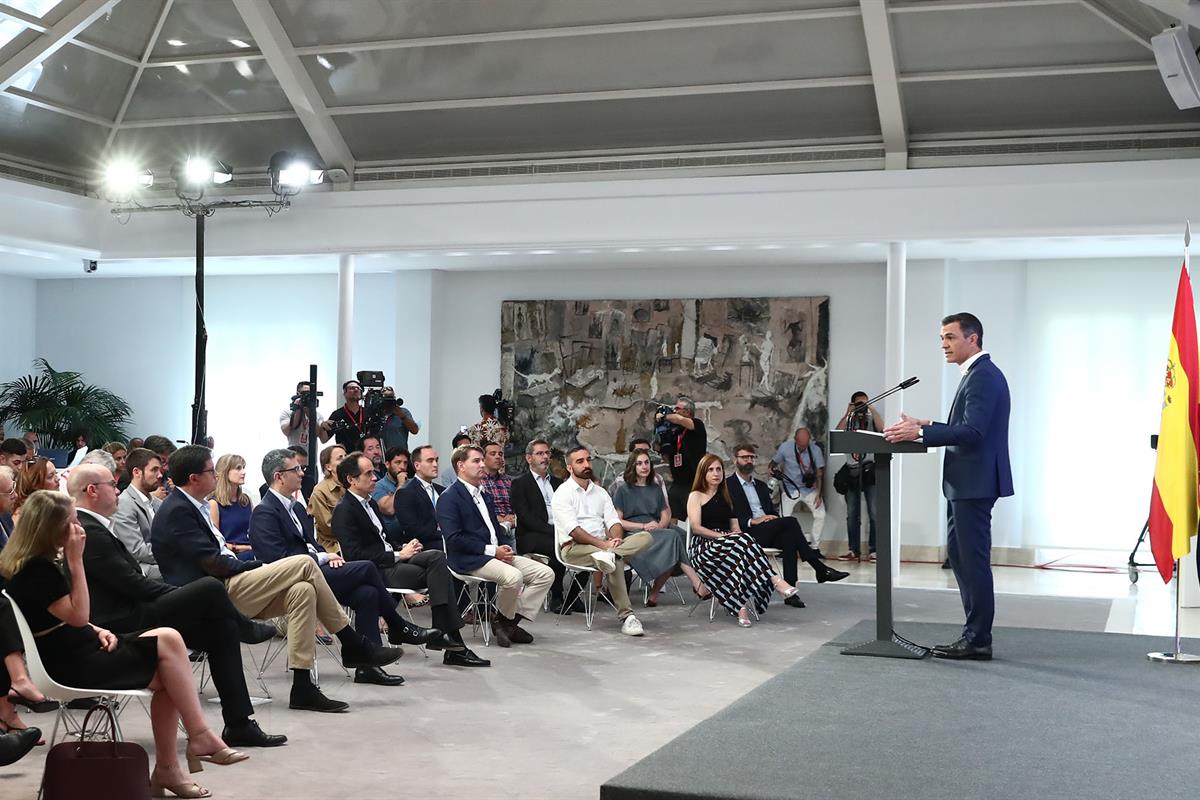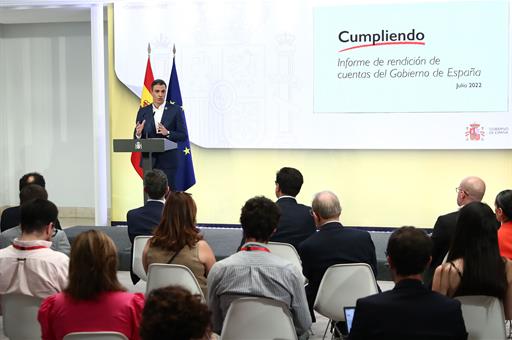Pedro Sánchez announces that the Government has already fulfilled 53% of its investiture commitments and expects to reach 61% by the end of the year
President's News - 2022.7.29
Moncloa Palace, Madrid
The President announced that the report concludes that the Government has already fulfilled 53.3% of its commitments and expects to reach 61% by the end of the year.
The Chief Executive pointed out that, despite the difficulties caused by the pandemic and the war in Ukraine, the Government "has continued to fulfil the commitments made to the citizens just over two and a half years ago, which had and continue to have a clear objective: to ensure that Spain moves forward; to transform our country by taking advantage of the enormous opportunities offered by the two great transitions we are undergoing: the digital transition and the ecological transition, which is, in part, an energy transition.
Pedro Sánchez stressed that "this government has always had two priorities: to protect and to advance. To protect the middle and working classes and to move Spain forward on an agenda to modernise our economy and the country as a whole". To this end, he assured that during these past months, marked by the war in Ukraine, the Government is doing everything in its power to protect workers and businesses, families and our industries, to cushion the impact that the war is having on prices. Just today we have found out the "bad data" of the CPI for July, which "simply confirms that inflation is the main economic concern of European governments and the main task ahead of the Government of Spain", he pointed out.
He explained that since prices began to rise, "the Government has mobilised close to 30 billion euros in aid to the middle and working classes, vulnerable groups and the most affected groups, representing over 2.3% of our GDP", an "enormous effort" that is double that made by countries such as Germany.
In view of the seriousness of the situation, given the threat of the gas cut-off from Russia, and with the aim of bending the inflation curve, Sánchez has announced that next Monday the government will approve "a package of urgent measures for energy efficiency and savings". "These are measures that we have been working on for weeks, that have been discussed with the private sector, that have been reported to all the administrations and also to the parliamentary groups, and that will be communicated to the population so that we can all collaborate in a task that is everyone's", because "saving energy is a priority and is everyone's task, in line with what other European countries are likewise doing".
He also announced that in September Spain will present two proposals to the European Commission to reform the electricity market, decoupling the price of gas from the price of electricity, and putting a ceiling on the price of CO2 emissions. "We are sure that these are two measures that will help bend the inflation curve," he said.
Spain grows and creates jobs
 Foto: Pool Moncloa/Fernando Calvo
Foto: Pool Moncloa/Fernando Calvo
During his assessment, the President of the Government of Spain stressed that neither the pandemic nor the war have slowed Spain's progress, highlighting three major structural advances agreed with the social agents and actors involved that are already bearing fruit: the labour reform, the education reform and the pension reform. "Despite all the difficulties and uncertainty, Spain is currently growing and creating jobs. More and better jobs. In this line, he recalled that today the extraordinary GDP growth figure of 1.1% in the second half of 2022 was announced, and yesterday we published excellent data from the Labour Force Survey that puts us at almost 20.5 million jobs. "Spain has solid foundations, in growth and in job creation, to be able to look to the future with guarantees and confidence", he stressed.
Likewise, the Chief Executive stressed that "Spain is making progress with European funds", with which more than 28,000 projects are already being financed throughout Spain, involving more than 19,000 companies, more than 5,500 local entities and more than 2,000 universities and technology centres. On this point, he announced that, thanks to the progress and fulfilment of the reforms, Spain has today received the second payment of the funds amounting to 12 billion euros. This is excellent news," he said, "and demonstrates the fulfilment of our commitments to the modernisation and progress of Spain", as requested by Europe. In fact, we are the first country to receive the second transfer of funds linked to the Recovery Plan.
Sánchez also stressed that "this government does not forget who it governs for": we serve the middle and working classes. And when a choice has to be made, we will be on the side of the middle and working classes, even if in doing so it is uncomfortable for the most powerful". In his opinion, "standing shoulder-to-shoulder is not simply a saying, it is an obligation for the sectors and companies that, in particular, are benefiting from this economic situation". This is why yesterday a Draft Law was registered in the Lower House of Parliament to create an extraordinary and temporary tax on the profits of large energy companies and large financial institutions, "which should help the country out of this situation", he said, while voicing his regret that the right, once again, voted against it.
Urgent fire-fighting measures
In view of the heat waves and fires that have been ravaging Spain in recent weeks as a result of climate change, Pedro Sánchez has announced that next Monday, the Council of Ministers will approve a Royal Decree-Law on urgent measures to combat forest fires. "A regulation to strengthen the coordination and capacities of all administrations in the tasks of fire prevention and extinction, and the restoration of affected areas".
Sánchez recalled that state resources have been involved in over 80% of the fires that have occurred this summer, despite this being a regional competence. This "must be the case", he said, "because we need collaboration between administrations". However, he also insisted on the need to "establish minimum standards so that existing differences between the fire-fighting services of some communities and others are erased, and to reinforce global coordination in this fundamental task".
Responding to the economic consequences of the war in Ukraine
 Foto: Pool Moncloa/Fernando Calvo
Foto: Pool Moncloa/Fernando Calvo
During his speech, the Chief Executive referred to the main initiatives launched by the Government to deal with the energy and inflationary consequences of the crisis caused by the Russian invasion of Ukraine, highlighting first the Iberian exception to limit the price of gas, "which is already reducing and will further reduce the bill paid by households in the regulated market by between 15% and 20% throughout the year".
He also referred to the extension of the 20 cents per litre fuel rebate to the end of the year, the limitation of the increase in rent, the reinforcement of the Minimum Basic Income, the reduction in VAT on electricity from 21% to 5% and in other electricity taxes, in addition to specific aid to the most affected economic sectors, such as transport, agriculture, fishing and gas-intensive industries.
Sánchez also pointed to new measures, including the 200 euro grant for vulnerable people, the 100 euro increase in grants for one million students, the rise in non-contributory pensions, and the promotion of mobility in public transport, with a 100% discount on all multi-journey passes for public service commuter, rolling stock and medium-distance trains operated by Renfe, and a 30% discount on urban and metropolitan transport passes.
The Government is also ensuring an equitable distribution of burdens, with measures such as the exceptional and temporary tax on large financial institutions and large electricity, gas and oil companies. All these measures, the president stressed, have not been voted in favour by the right or the far right.
"I have never and will never take a back seat; I will not sit back and wait for problems to resolve themselves. I will always put my best foot forward and strive to solve every problem along the way. Because this is how I understand politics and public service: to govern with determination and dialogue, with empathy and social sensitivity," the President concluded.
Overall balance of achievements and developments
The fourth edition of the "Cumpliendo" report, presented today, responds to the President of the Government of Spain's commitment to regularly and systematically be accountable to the public. This initiative consolidates our country's position at the international forefront in this area, allows us to advance in terms of democratic quality and in the culture of public governance, and to combat political disaffection, subjecting government action to the scrutiny of citizens, and to develop a process of institutional learning enriched by public debate.
The methodology applied to draw up this report has been consolidated and endorsed by the group of experts who have already collaborated in previous works.
The main novelty of this edition is the expansion of the information displayed in the dynamic visualisation panel and in the open data archive, both available on the Cumpliendo microsite, which is organised by sectoral themes.
Since the inauguration, the government has made 1,494 commitments, 13 more than in the previous report, and a consequence of the crisis over the invasion of Ukraine and the NATO summit. Of these 1,494 commitments, 53.3% have already been fulfilled, a 5.3% increase on the forecast made in December 2021, and a 61.0% fulfilment rate is expected in the next six months.
If commitments fulfilled are added to those currently in progress, almost all the commitments have been activated, reaching 98.1% of the total.
With regard to the total of 239 commitments made by the President in his investiture speech to the General Courts, a very significant level of 59% has been achieved, and the forecast is to reach 67% in the second half of the year.
Of the 428 commitments stemming from the Progressive Coalition Agreement, 54.9% have already been met, with an expected evolution up to December 2022 of 62.6%.
Furthermore, as of 30 June, 39.6% of the commitments associated with the Recovery, Transformation and Resilience Plan have been met, and it is expected that by December 2022 this figure will reach 48.1%.
Compliance by areas
The Report presented today analyses the most relevant commitments met and in progress for each of the main Government action directives: ecological transition, digital transformation, gender equality and social and territorial cohesion.
Green Spain
The Government has so far fulfilled 42.4% of the commitments in the "Green Spain" area and is expected to reach 52.2% by December 2022.
Among these initiatives, notable are the approval of several PERTE: the Circular Economy PERTE, endowed with 1.2 billion euros; the Water Cycle Digitalisation PERTE, which will mobilise a total investment of 3.06 billion euros; the agri-food sector PERTE, endowed with 1.8 billion euros; and the Naval Industry PERTE, with a total investment of 1.46 billion euros.
In addition, the mechanism to limit the price of gas and reduce the price of electricity on the Iberian Peninsula, known as the Iberian exception, has been approved by Royal Decree-Law, with the approval of the European Commission. Electro-intensive industry and vulnerable people have also been supported through measures in the field of energy, within the framework of the National Plan to respond to the economic and social consequences of the war in Ukraine.
The Law on waste and contaminated soils for a circular economy has also been approved, and the parliamentary process is ongoing with the presentation to parliament of the Draft Law on the remuneration of CO2 not emitted from the electricity market. The Strategic Plan for the CAP (PEPAC) has also been given the green light; the Draft Law establishing the rules for the application of the new Common Agricultural Policy (CAP) in Spain has been passed; and the Draft Law on Sustainable Fisheries and Fisheries Research has been approved.
We can add to this a new extraordinary edition of the Sustainable Tourism Plan in Destinations; the Energy Saving and Efficiency Measures Plan, aimed at the General State Administration (AGE) and state public sector entities, and the approval of the Draft Law for the Protection, Rights and Welfare of Animals, among other measures.
Digital Spain
The Executive has already fulfilled 48% of the 123 commitments made in the field of Digital Transformation, with which it continues to deepen the modernisation of the country, and 51.2% are in progress.
Among the measures adopted, the following stand out: the approval of the General Telecommunications Law and the Microelectronics and Semiconductors PERTE, which will mobilise public investment of 12.25 billion euros; the New Language Economy, with a budget of 1.1 billion euros; and the Aerospace PERTE, which plans to mobilise around 4.53 billion euros. The National Cybersecurity Plan has also been approved, with a budget of more than 1 billion euros.
Meanwhile, the Draft Law to promote the start-up ecosystem (Start-up Law) and the Law to reform the Law on Science, Technology and Innovation are progressing through parliament; the Digital Kit programme to support the digital transformation of SMEs is being implemented; and the General Law on Audiovisual Communication has been approved.
Other important initiatives include the UNICO-Banda Ancha Programme, which will provide 250 million euros in aid to extend ultrafast broadband; the approval of four complementary R&D&I plans with the Autonomous Regions in the strategic areas of agri-food, astrophysics and high-energy physics, advanced materials and biodiversity; the publication of the NHS Digital Health Strategy; and the territorial distribution of funding for the actions of the Vocational Training Modernisation Plan.
Spain without a gender gap
In the area of gender equality, 64% of the 111 commitments made have already been fulfilled, and the forecast is for a 71.2% fulfilment rate to have been reached by December 2022.
In this area, of special note are the approval of the Comprehensive Law for Equal Treatment and Non-Discrimination; the Draft Law for the real and effective equality of trans people and for the guarantee of the rights of LGTBI people; the Draft Organic Law amending the Law on sexual and reproductive health and voluntary termination of pregnancy, and the Organic Law amending the Organic Law of the Criminal Code, to criminalise the harassment of women who go to clinics for voluntary termination of pregnancy.
The draft Organic Law on the comprehensive guarantee of sexual freedom continues to be processed in the General Courts and work continues on the drafting of the Comprehensive Law to Combat Trafficking. Measures have also been put in place to allow access to certain services and resources for potential victims of human trafficking and sexual exploitation, including those resulting from the displacement of people fleeing the armed conflict in Ukraine.
Also approved are the 1st Action Plan against the sexual exploitation of children and adolescents of the child protection system; the creation of 233 new VioGen Teams of the Guardia Civil throughout the country; the publication of the protocol for forensic medical action in cases of sexual violence, and the development of a kit of samples for toxicological analysis in cases of chemical submission; the 3rd Strategic Plan for the Effective Equality of Women and Men (PEIEM) 2022-2025; and the ratification of Convention 189 of the International Labour Organisation for domestic workers.
Cohesive and inclusive Spain
The Executive has already fulfilled 54.3% of its commitments on social cohesion and 57.1% on territorial cohesion.
This section includes the 2022 increase of 2.5% for contributory pensions and 3% for non-contributory pensions; the approval of the Royal Decree-Law establishing a new contribution system for self-employed workers; the territorial distribution of more than 2.7 million euros to deploy the new Active Employment Policies; and the approval of the Draft Employment Law, the first National Strategy for the Promotion of Self-Employment 2022-2027 and the 2022 public employment offer for the stabilisation of temporary employment in the General State Administration.
Also noteworthy are the Social Economy and Care PERTE, with an investment of 800 million euros; the Draft Law amending various regulations to consolidate the Equity, Universality and Cohesion of the National Health System (SNS); and the launch of the 024 line for Suicidal Behaviour. Likewise, the Law on Democratic Memory, the Draft Law on the Right to Housing, the Second Action Plan to Combat Hate Crimes, and the Plan for the Reception of Displaced Persons from Ukraine, to whom care and shelter have been provided, have also been approved.
Other measures implemented include the Organic Law on the Organisation and Integration of Vocational Training; the Law on University Coexistence; the Draft Organic Law on the University System (LOSU); the Draft Law on Cooperation for Sustainable Development and Global Solidarity; the State Action Plan for the European Child Guarantee (2022- 2030); and the Artist's Statute. Also included are initiatives such as the Youth Rental Voucher, the Draft Law on the Right to Housing; the National Strategic Plan for the Reduction of Childhood Obesity; the updating of the Common Portfolio of NHS Services in the field of oral health; the Draft Law on the Prevention of Food Losses and Waste, and the work being done on a Law on Families and a Law on Social Services.
Non official translation





